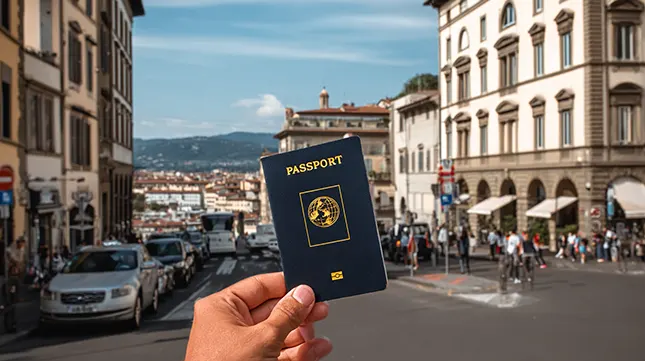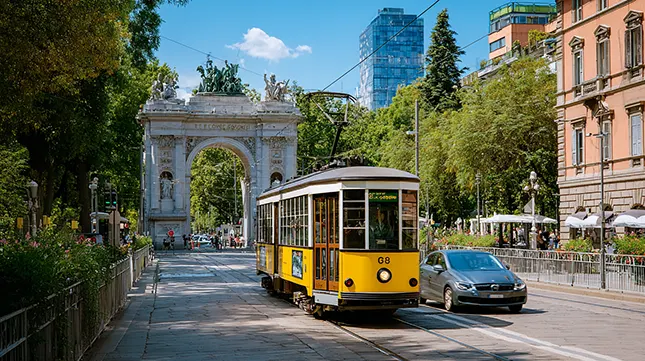Moving to Italy from UK – A Complete Guide

Have you been dreaming of moving to Italy?
Relocating to Italy from the United Kingdom is more than a change of address—it’s a leap into a new way of life.
Can you picture yourself waking up to the scent of espresso, strolling through cobblestone piazzas, and savouring authentic pasta al dente? Then please read on.
Along with “la dolce vita” (the good life) come some practical considerations that will need your attention.
Visa applications, healthcare, banking, taxes, and cultural adaptation are a few of the obstacles to overcome before your dream can become a reality.
Our guide unpacks each step with clarity and warmth, equipping you with solid advice so your move is smooth, informed, and, most importantly, enjoyable.
Whether you plan to move to bustling Milan, historic Florence, or coastal Sardinia, our comprehensive walkthrough ensures you’re ready, from packing your bags to settling into la bella Italia (beautiful Italy)!
Why Italy? Lifestyle, Climate & Culture

Discover why so many Brits are drawn to Italy’s slower pace, Mediterranean lifestyle, and world-renowned cuisine.
Thousands of British expats already live in Italy, almost 70,000 in fact, testament to its enduring appeal, but why do so many want to leap?
Italy captures hearts with its distinct regional flair, from Alpine peaks to sun‑drenched Amalfi cliffs.
The warm Mediterranean climate nourishes both passion and produce; the country is a haven for lovers of art, fashion, and culinary tradition.
Whether you’re drawn to Renaissance architecture in Florence or the relaxed pace of Puglia, life in Italy offers a unique fusion of vibrant markets, la famiglia (the family) and a slower rhythm.
The pursuit of quality of life, through access to locally sourced cuisine, rich history, and community living, is what attracts expats from the UK year after year.
Choosing Your Ideal Destination

From Tuscany’s vineyards to Sicily’s sun-drenched coastlines, Italy offers a dream destination for every expat.
Well before packing your bags, you need to consider where you want to live your dream lifestyle.
Craving cosmopolitan buzz? Rome or Milan may be for you. Prefer scenic peace? Tuscany’s rolling hills or Sicilian coast could fit.
Each region breaks down into unique pros and cons, job markets, schooling, housing prices, and expat communities.
Here are six top locations in Italy popular with UK expats:
- Tuscany (Chianti, Lucca, Florence): Renowned for its rolling hills, vineyards, and cultural heritage, Tuscany is a favourite among retirees and creatives. British expats are drawn to the relaxed pace of life and picturesque countryside. Towns like Lucca offer historic charm with easy access to Florence’s international connections.
- Rome: Italy’s bustling capital appeals to younger professionals and families seeking career opportunities and rich history. British expats enjoy Rome’s vibrant expat community, world-class dining, and ancient landmarks. It also has excellent international schools and direct flights to the UK.
- Lake Como: This scenic lake region in northern Italy is a magnet for British retirees and second-home buyers. The area combines natural beauty with quaint towns like Bellagio and Menaggio. It offers a peaceful lifestyle, stunning views, and good access to Milan.
- Puglia (Apulia): Known for its whitewashed villages, olive groves, and Adriatic coastline, Puglia is increasingly popular with UK buyers. Property is still affordable here compared to northern Italy. Towns like Ostuni and Lecce have vibrant markets, historic architecture, and relaxed Mediterranean living.
- Le Marche: Often described as “the next Tuscany,” Le Marche offers beautiful countryside, Adriatic beaches, and fewer tourists. British expats value its authenticity and lower property prices. It’s ideal for those seeking a quieter, more traditional Italian lifestyle.
- Sicily: Sicily combines affordable living with a warm climate, stunning coastlines, and a rich cultural heritage. British expats are drawn to cities like Palermo and Catania, as well as charming rural villages. The slower pace of life and welcoming communities are key attractions.
Before you finally decide where you think will be your best location, make sure you visit, explore, and speak to other expats already living in the area.
Moving abroad is a huge undertaking, so you want to get it right!
Visas & Residency – What You Must Know

Understand the visa and residency options UK citizens need before relocating to Italy post-Brexit.
The visa process can be off-putting, but it is a necessary part of your Italian journey.
Now that Britain has left the EU, UK nationals planning to stay in the country longer than 90 days within any 180 days need a long-stay (“D”) visa and must apply for a permesso di soggiorno within eight days of arrival.
There are numerous visas you can apply for, depending on your circumstances or reasons for the move:
- Elective Residence Visa (Visto per Residenza Elettiva) – Ideal for retirees or financially independent individuals who can support themselves without working in Italy.
- Work Visa (National Visa for Employment – Lavoro Subordinato) – Required for UK citizens with a job offer from an Italian employer. Subject to annual quotas and sponsorship.
- Self-Employment Visa (Lavoro Autonomo) – For freelancers, consultants, or business owners who want to work independently in Italy. Quota-restricted and documentation-heavy.
- Investor Visa (Visto per Investitori) – Grants residency to those who invest in Italian businesses, government bonds, or philanthropic projects. Minimum investment starts at €250,000.
- Family Reunification Visa (Ricongiungimento Familiare) – Allows UK citizens to join close family members who are legal residents in Italy.
- Student Visa (Visto per Studio) – For those enrolled in an accredited Italian educational institution. It can sometimes lead to post-study residency options.
No matter which visas you apply for, allow several months for processing, so apply early at your nearest Italian consulate.
Understanding the Italian Tax System
Taxes will apply to almost all those planning to emigrate to Italy long term, be it a house purchase, self-employment or securing employment, knowing what to expect is half the battle.
First, you must apply for a Codice Fiscale.
Italy’s tax landscape can feel complex to begin with, but there are perks for newcomers. Standard income tax (IRPEF) is progressive (23–43%) plus regional and municipal levies.
However, a “new residents” regime offers a 70% exemption on eligible foreign income (90% in the south) for the first five years.
For high earners, the optional flat tax of €100,000 per year on overseas income remains attractive, though some adjustments to this scheme have been made recently.
Social-security contributions can range from 10% to 30% of salary, depending on the sector you plan to work in.
For more detailed information about taxes in Italy, visit the Experts for Expats website.
Why Italy Could Be the Best-Kept Secret for UK Property Buyers
When British expats dream of owning a home abroad, France and Spain usually steal the spotlight. But Italy remains a captivating and often overlooked alternative, especially for those seeking character, culture, and affordability.
While iconic cities like Milan and Florence continue to attract global attention, they come with premium price tags.
Venture into Italy’s idyllic countryside, however, and you’ll discover far more affordable options in regions like Umbria, Trapani, and Calabria.
Calabria, nestled at the southern tip of Italy’s boot, offers a diverse property market, from rustic stone villas to seaside apartments, with prices far below those in Western Europe.
As of 2025, the average house price in Italy stands at around €384,000 (£285,000), though costs vary significantly by location and condition; they can often be purchased for considerably lower than the country’s average.
Before making a purchase, it’s vital to factor in local property taxes, renovation expenses, employment prospects, and legal fees.
The same applies to rental homes. Prices also vary considerably but you can expect to rent a one-bedroom apartment close to the city for around £650-£750 per month with prices dropping to around £500 outside the busier areas.
Trusted platforms like Idealista and Gate-away offer a great starting point for browsing listings and comparing regional markets so that you have a realistic idea of how far your budget will stretch for renting and purchasing a home.
Banking & ID in Italy: Getting Set Up as an Expat

Opening a bank account and getting your Italian ID are essential first steps after your arrival.
Opening a local Italian bank account is one of the first practical steps after relocating. It makes paying rent, setting up utilities, and managing day-to-day expenses much easier.
Two of Italy’s most reliable banks, Unicredit SpA and Intesa Sanpaolo, are popular for expats seeking to establish a local account.
To open an account, you’ll typically need your codice fiscale (tax number), proof of income or residency, and your permesso di soggiorno if you’re staying long-term.
Many newcomers also explore online or “neo-banks” like N26 or Wise, which offer multi-currency euro accounts with low fees and convenient app-based management.
These are especially handy while you’re still settling in.
Once you’re officially resident, apply for the Carta d’Identità Elettronica through your local Comune.
This electronic ID card serves as your primary identification and will be required for everything from healthcare registration to travel within the EU.
Maximise Your Money: Why FX Specialists Matter When Moving Funds to Italy

Using an FX specialist can help you save thousands when transferring funds to Italy.
When relocating abroad, especially if you’re selling a property in the UK to fund a new home in Italy, getting the best exchange rate becomes essential.
Even a small shift in the currency markets can make a big difference when you’re transferring large sums. A well-timed transaction could potentially save you thousands of pounds.
That’s why many expats turn to foreign exchange (FX) specialists rather than relying solely on traditional banks.
Reputable FX companies such as Halo Financial don’t just offer better exchange rates; they also provide tailored services, such as market monitoring, rate alerts, and forward contracts that let you lock in a favourable rate ahead of time.
This helps take the stress out of unpredictable currency swings and gives you more control over your budget.
Many FX providers are also regulated and experienced in handling high-value international transfers, offering peace of mind alongside competitive rates.
Be aware that while you can usually send up to €1.2 million, some limits and compliance checks may apply, and transfer fees can vary depending on the amount and provider.
Partnering with a trusted FX company could ultimately ensure you get the best value for your money, making your move to Italy that much smoother and more cost-efficient.
New Country, New Job – Finding Work in Italy

Italy’s job market offers opportunities in tech, tourism, education, and remote work for UK expats.
Finding employment in Italy as a UK national can be rewarding, but it’s essential to understand the challenges and options available.
In most cases, employers must sponsor a work visa, and positions are often subject to Italy’s annual immigration quotas.
Proficiency in Italian is a significant advantage, especially in local businesses, healthcare, education, and public services.
For skilled professionals, the EU Blue Card offers a potential pathway.
This visa is designed for highly qualified workers who hold a recognised university degree and have secured a job offer with a minimum annual salary, typically starting at around €25,000 (£21,400). However, this can vary by sector and region.
Self-employment is another route, including options for consultants, freelancers, and entrepreneurs.
While documentation requirements can be extensive, many UK expats successfully run small businesses or provide services in Italy’s growing gig economy.
Remote work has become increasingly viable, and Italy recently introduced a Digital Nomad Visa, allowing non-EU professionals to live in the country while working for foreign employers or clients.
It’s a promising option for those in tech, marketing, writing, or digital services, though income thresholds and proof of remote work are usually required.
Whichever path you pursue, don’t forget that fluency or a strong command of the Italian language can dramatically expand your job prospects, boost your earning potential, and ease your integration into local communities.
Learning Italian & Embracing the Local Culture

Speaking Italian and understanding local customs are key to feeling truly at home in Italy.
When moving to Italy, one of the best things you can do for yourself is to start learning the language, even just the basics.
A simple “buongiorno” or “grazie” goes a long way in making everyday life smoother, from chatting with neighbours and work colleagues to ordering coffee at the local bar.
While many Italians speak some English (especially in cities), showing an effort to talk to Italians earns respect and opens doors both socially and professionally.
You can find Italian classes through your local Comune (town hall), adult education centres, or private language schools.
Many communities also run language exchange groups and conversation meetups, where expats and locals connect to help one another learn.
Cities like Milan, for instance, have expat-friendly hubs like Easy Milano, which offer networking events and valuable resources to help newcomers feel at home.
But cultural integration goes beyond language.
Understanding local customs, like the afternoon riposo (a few quiet hours when shops close), traditional greetings (like a kiss on both cheeks), or why punctuality is often more relaxed, can help you avoid awkward moments and build authentic relationships.
Italians place a high value on community, food, and friendly interaction, so embracing these traditions can really enrich your experience.
Whether you’re planning to stay short-term or long-term, immersing yourself in the language and culture can transform Italy from a place you live in into a place you truly belong.
Getting Around Italy: Cars, Trains, Bikes & Beyond

Whether you drive, cycle, or take the train, Italy offers a range of efficient transport options.
Italy offers a variety of ways to get around, whether you’re commuting in a city or exploring the countryside.
If you plan to drive, remember that Italians drive on the right-hand side, and UK residents will need an International Driving Permit (IDP) to start.
Once you’ve lived in Italy for a year, you’re required to convert your UK licence to an Italian one.
Motorways (autostrade) are well-maintained but often toll-based, while historic towns have ZTL zones (restricted areas) that require special permits.
Driving in city centres can be tricky, and if you are new to driving in Italy, the Italians have a “gung-ho” attitude to driving, so many expats find public transport a simpler option.
You will find cities are well-served by trains, buses, trams, and metro systems, especially via Trenitalia and Italo.
In urban areas, cycling and electric scooters are also increasingly popular.
Many towns now have dedicated bike lanes and scooter hire apps, making it easy to get around without a car, and helping you save money while living more sustainably.
Staying Healthy in Italy: Public & Private Healthcare Explained

Italy’s dual public-private healthcare system ensures access to affordable, quality medical care.
Italy’s public healthcare system, Servizio Sanitario Nazionale (SSN), is well-regarded and accessible to legal residents.
Once you’ve registered through your local health authority (iscrizione obbligatoria), you’ll be assigned a family doctor (medico di famiglia) and gain access to public hospitals, specialist care, and emergency services.
Fees for services vary, but retirees and certain income brackets may qualify for reduced contributions or exemptions.
British nationals who hold an S1 form or fall under the Withdrawal Agreement can still access the SSN under reciprocal healthcare agreements.
That said, many UK expats also opt for private health insurance to reduce waiting times or access English-speaking specialists.
A common approach is to use a hybrid system, relying on public healthcare for routine needs while using private clinics for more urgent or personalised care.
You can find more information about eligibility and coverage via the UK government’s healthcare in Italy page.
Schooling in Italy: Public, Private & International Options

Families moving to Italy can choose from public schools, private institutions, or international programmes.
If you’re relocating to Italy with children, understanding your education options is going to be a key issue.
Public schools are free and follow the Italian national curriculum, ideal for long-term expats looking to integrate fully.
However, they teach entirely in Italian, which may be challenging for newcomers without prior exposure.
For a more familiar approach, many families opt for international schools that offer the British curriculum, IB (International Baccalaureate), or American-style education.
These schools are found in regions like Lombardy, Lazio, and Tuscany, and are popular among expat families, though bear in mind, tuition fees can be high.
If your child is arriving with UK qualifications, you may need to go through Italy’s Aptitude Recognition process to validate certificates for secondary or higher education placement. It’s wise to begin this process early to avoid delays.
For a full list of international schools in Italy, platforms like International Schools Database can be helpful.
Bringing Pets to Italy: What UK Expats Need to Know

Bringing your pet to Italy? Make sure you follow EU travel rules and prepare documentation in advance.
Bringing your much-loved furry friends with you?
The good news is that it’s entirely doable, but there are rules you’ll need to follow.
Pets travelling from the UK must be microchipped, vaccinated against rabies, and accompanied by an Animal Health Certificate issued within 10 days of travel.
Dogs also require a tapeworm treatment if they’re older than three months.
Some cities have breed restrictions; for instance, Venice prohibits specific dog breeds, so check local regulations before you move.
It’s important to organise pet-friendly transport, especially if flying, and to ensure your pet is comfortable and safe during the journey. Check out pets2go2 or Petair, both are reliable companies.
Also, keep copies of all documentation handy, including proof of vaccinations and your vet’s certification.
Planning ahead not only ensures your pet’s smooth entry into Italy but also helps ease their transition to a new home alongside you.
For detailed information, check out the official Italian Ministry of Health website.
Tip Bank: Advice Before You Move

Follow these essential tips to make your move to Italy stress-free and well organised.
Now that you’ve explored the key steps to relocating, it’s time to bring everything together.
Whether you’re still deciding or already preparing for your move to Italy, this 8-point quick-reference checklist distils the essentials.
From paperwork to cultural prep, these practical tips will help you feel confident and stay one step ahead:
- Visit ahead: test locations and communities.
- Start early: apply for visas, school places, and translations.
- Use professional help: legal assistance, removals services, translators.
- Learn essential Italian phrases: and embrace local customs.
- Network with expats: groups like Easy Milano are invaluable uk.
- Explore accommodation costs: Rent or buy set a budget.
- Budget beyond rent: include utilities, taxes, transfer fees.
- Have patience with bureaucracy: Italian administrations move slowly at times.
Trusted Removals to Italy – Let White & Company Lead the Way

Moving to Italy is easy with White & Company.
Moving abroad is a massive step, full of excitement, nerves, and endless to-do lists – this is no different if you are moving to Italy from the UK.
At White & Company, we understand that relocating to Italy (or anywhere in Europe) isn’t just about boxes and furniture; it’s about starting a new chapter with peace of mind.
That’s why our dedicated Italian Removals service is designed to take the stress out of your move.
With over 150 years of experience, we’ve helped thousands of individuals and families relocate with confidence, care, and professionalism.
Plus, we can offer you storage both in the UK and via our trusted partners in Italy, should you need it.
As proud members of BAR, FIDI, and OMNI, we meet the highest global standards in international moving.
From expertly packing your fragile items to navigating customs and delivery, our UK-based teams ensure your belongings reach your new Italian home safely and on time.
So, whether you’re moving to Milan, Florence, or a quiet coastal village, let us handle the logistics while you focus on the adventure.
Ready to get started? Contact us today, request a quick quote, or speak to Brad, our friendly chatbot, in the bottom right of this page. We’re here to help every step of the way.

Max is a seasoned writer and blogger in the real estate and home moving sectors, as well as a knowledgeable source of information for expatriates living and working abroad. His detailed insights have helped thousands of people move and live abroad with greater simplicity and ease.
Posted in: News
Leave a Comment (0) ↓


